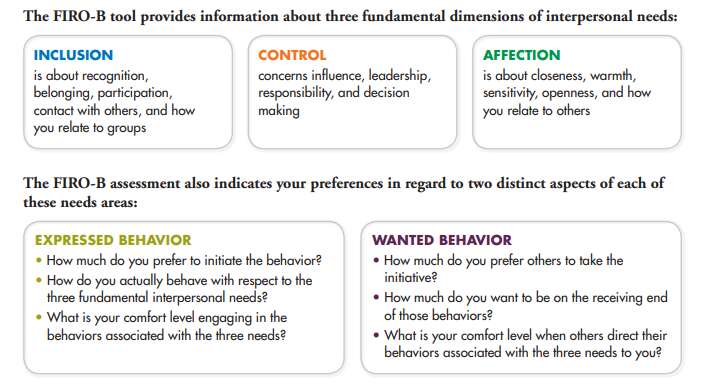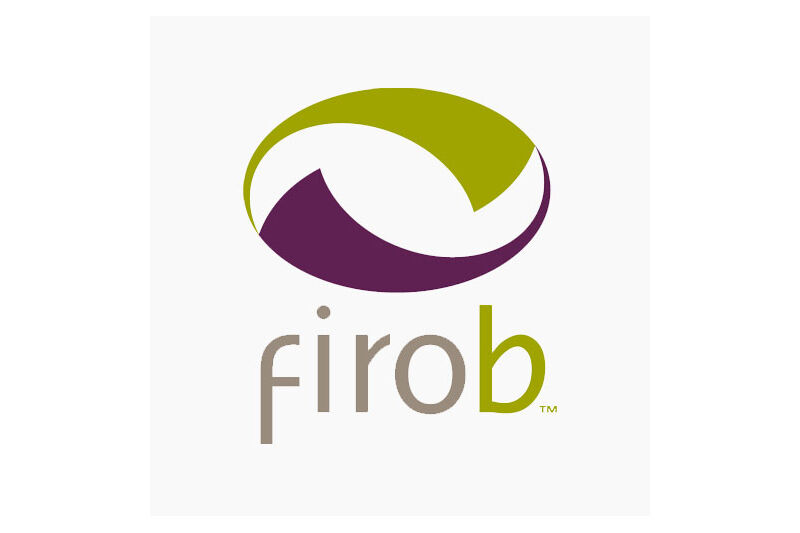FIRO-B® - Fundamental Interpersonal Relations Orientation
Building High Performance Teams
Despite the shift to working from home and communicating virtually, collaboration and teamwork is still a key factor in workplace success. However, individuals and leaders are often unaware of the impacts of their actions when working with others.
The Fundamental Interpersonal Relations Orientation™ (FIRO®) instrument helps people understand their interpersonal needs and how those needs influence their communication style and behavior—and in the process improve their peer relationships and professional performance. The FIRO assessment has helped individuals, teams and organizations grow and succeed by serving as a catalyst for positive behavioral change.
FIRO framework provides a unique view of the team members’ differing needs, wants and behavior, helping resolve issues quickly.
What’s the FIRO-B®?
For more than 50 years, the Fundamental Interpersonal Relations Orientation-Behavior™ (FIRO-B®) assessment has helped people around the world unlock the mysteries of human interaction at work and in their personal life. Easy to complete, this assessment quickly gathers critical insights into how an individual’s needs for inclusion, control, and openness can shape his or her interactions with others at work and personal life.
What does it assess?
The FIRO® instruments address the core of personality – people’s underlying needs – and precisely identify sources of tension in relationships.
Use the Fundamental Interpersonal Relations Orientation-Behavior™ (FIRO-B®) instrument to cultivate highly effective teams by helping team members discover how their needs for participation, influence and closeness form their team’s success. The instrument measures interpersonal needs on three scales – Inclusion/Participation, Control/Influence, and Affection/ Closeness. These needs influence how we interact with people.
On the assessment, these three needs are measured in two dimensions: “expressed” behavior (how much we initiate behavior) and “wanted” behavior (how much we prefer others to initiate behavior).

The FIRO-B® assessment helps us understand the social motivators that influence the behaviors we use and expect others to use in our interactions.
The need for inclusion depicts the aspect of social interaction, as well as the aspect of association with others. The high score in this need indicates the priority of an individual to include someone in the group or get included in someone’s group. These individuals often possess a desire to belong and to be accepted by others. The need to get included and associated with others is called expressed inclusion and a need to be accepted and included by others is called wanted inclusion. According to studies, both expressed and wanted inclusion are positively connected to extraversion.
The need for control in FIRO-B relates to the need for power, i.e. keeping the right balance of influence and power in interaction with others. The individuals with more expressed control tend to have the need for exerting power and influence and even to take responsibility in order to execute things under their control. On the other hand, the wanted inclusion is the need for letting others to have power and influence. Moreover, it is the need to be under the guidance and responsibility of others.
The need for affection refers to the need for closeness, love and intimacy. The expressed affection is a need to have intimacy and close friendship with others. On the other hand, individuals with a highe level of the wanted affection expect others to show love and affection towards them. The need for affection shouldn’t be confused with romantic relationship feelings, but it is the need to feel close and comfortable in interpersonal relationships with others. The need for affection is positively correlated with both extraversion and agreeableness.
The FIRO Business Assessment and the FIRO Business™ Leadership Report
The FIRO Business assessment and the FIRO Business™ Leadership Report help leaders and potential leaders understand their behavior and provide an excellent foundation for moving development forward. Leaders’ level of self-awareness provides the platform from which they make decisions, yet their performance depends largely on their ability and willingness to connect with others. At its core, leadership involves how individuals interact with their direct reports, peers, and managers.
The FIRO Business assessment helps organizations develop effective leaders while improving organizational performance.
Working in an organization means working with other people. How you interact with and relate to many different kinds of people plays an important role in your success at work. This report demonstrates how your results from the FIRO Business® assessment can help you understand your interpersonal needs and how you interact with others in your organization. Information from the FIRO Business tool can help you maximize the impact of your actions and behavior at work, identify options for increasing your job satisfaction and productivity, and explore alternative ways to achieve your goals

